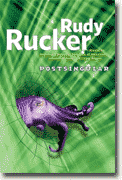Postsingular
Rudy Rucker
book reviews:
· general fiction
· chick lit/romance
· sci-fi/fantasy
· graphic novels
· nonfiction
· audio books
· author interviews
· children's books @
curledupkids.com
· DVD reviews @
curledupdvd.com
newsletter
win books
buy online
links
home
for authors
& publishers
for reviewers

 |
Postsingular Rudy Rucker Tor Paperback 320 pages February 2009 |
|
Anything goes when the Internet comes to life in Rudy Rucker’s wild, trippy novel Postsingular
Despite the strangeness, Rucker gives us just enough to warrant suspending our utter and complete disbelief. Unsurprisingly enough, the number-one use of the orphidnet is to look under people’s clothing. It doesn’t take long for spam to cover everything: ads follow people around in the real world, pestering them to open links or vote for presidents. Spyware becomes a psychological disease. As with the Internet today, the youth form the bulk of net-savvy users, and their acceptance of the devoid-of-privacy orphidnet and its human implications is one of the places where the book comfortably delves into a more philosophical mode. Never too comfortably, though; more than anything else, Rucker’s manic prose always evades traditional notions of sense, but never too much as to be rendered nonsensical. Consider this excerpt from daily life in the orphidnet: Seeking a filter to block this ad too, Jayjay searched the orphidnet and found a high-rated virtual defender resembling a chihuahua. He scanned the chihuahua’s machine code to make sure the virtual dog didn’t have Homesteady hookworms, then recruited him into his kennel. The Chihuahua yapped at the other filter dogs, educating them. They set off in a baying pack, digging through Jayjay’s recent inputs, competing to be the fastest and the most accurate filter dog of all, mating and spawning as they ran. All this took only seconds.That being said, the prose has substantial flaws. Some of the writing is just plain awful, like this painful piece of dialogue: “I’m capable of worrying about other people, Chu. You could learn from me.”The characters are also wooden and their relationship troubles only marginally interesting. But quality writing is such an irrelevant measure for this delightful novel with irreverence like no other. The creative slang alone easily drives the novel forward into the ever more outlandish and elusively engaging. Plus even the writing has its good points, admittedly in the expression of ideas: “How would it be if everyone could teleport? The magical places would be overrun. Or maybe not. People already that the freedom to go anywhere in the world, yet most of them stuck to the beaten track, or worse, stayed home watching life via the orphidnet, safe and sterile.” Postsingular Originally published on Curled Up With A Good Book at www.curledup.com. © Max Falkowitz, 2008 |
| Also by Rudy Rucker: |
|
|
|
 Click here to learn more about this month's sponsor! |
|
| fiction · sf/f · comic books · nonfiction · audio newsletter · free book contest · buy books online review index · links · · authors & publishers reviewers |
|
| site by ELBO Computing Resources, Inc. | |
 Some time later, Ond has developed his own nanobots, the orphids, which replicate and spread across the globe, developing virtual representations of everything they touch and creating an Internet in real space. Through the orphidnet, people can message each other telepathically, see anything, be anywhere, and have access to any thought. A new art form—the metanovel—emerges, a collection of images, ideas, emotions and text never really all that defined (this may be because even the metanovelists don’t know what it is yet). And this isn’t some passive Internet—the orphids develop their own artificial intelligences, which many use as external processors to help them think faster and more elaborately. Add in giant visitors from another dimension with a craving for cuttlefish, a virtual pig which can get you high off infinite knowledge, and software attack dogs to protect against spam, and you get a vague idea of life in the “postsingular” world.
Some time later, Ond has developed his own nanobots, the orphids, which replicate and spread across the globe, developing virtual representations of everything they touch and creating an Internet in real space. Through the orphidnet, people can message each other telepathically, see anything, be anywhere, and have access to any thought. A new art form—the metanovel—emerges, a collection of images, ideas, emotions and text never really all that defined (this may be because even the metanovelists don’t know what it is yet). And this isn’t some passive Internet—the orphids develop their own artificial intelligences, which many use as external processors to help them think faster and more elaborately. Add in giant visitors from another dimension with a craving for cuttlefish, a virtual pig which can get you high off infinite knowledge, and software attack dogs to protect against spam, and you get a vague idea of life in the “postsingular” world.